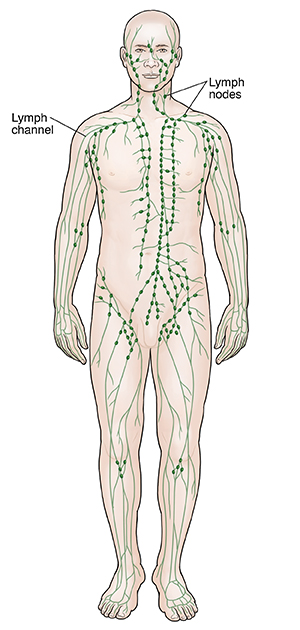You have a bacterial infection of a lymph node. The lymph nodes are part of your immune system. They're found throughout the body. Enlarged lymph nodes are most obvious if the nodes are located under the skin's surface. These include the ones under the jaw and along the side of the neck and the ones in the armpits and groin. An infection or inflammation in nearby tissues causes the lymph nodes to swell and become tender.
When a bacterial infection occurs in the lymph node, it becomes very painful. The nearby skin gets red and warm. You may also have a fever.
Antibiotics and warm compresses are used to treat this infection. The pain and redness will get better over the next 7 to 10 days. Swelling may take a few months to completely go away.
Sometimes an abscess (with pus) forms inside the lymph node. If this happens, antibiotics may not be enough to cure the infection. Your health care provider may advise draining it with a needle or that minor surgery is needed to better drain the pus. You may need blood tests or a study of the pus inside the abscess to guide your treatment.
Home care
Follow these guidelines when caring for yourself at home:
-
Take all of the antibiotic medicine exactly as prescribed until it's gone. Be careful not to miss any doses.
-
Make a warm compress by running warm water over a washcloth. Apply it to the sore area until the cloth cools off. Repeat this for 20 minutes. Use the warm compress 3 times a day for the first 3 days, or until the pain and redness start to get better. The heat will increase the blood flow to the area and speed the healing process. Be sure the compress is not so hot that it will burn your skin.
-
You may use acetaminophen or ibuprofen to control pain and fever, unless another medicine was prescribed for this. Don’t use ibuprofen in children under 6 months of age. If you have chronic liver or kidney disease, talk with your health care provider before using these medicines. Also talk with your provider if you’ve had a stomach ulcer or digestive tract bleeding. Don’t give aspirin to anyone under 18 years of age who is ill with a fever. It may cause severe liver damage.
Follow-up care
Follow up with your health care provider, or as advised, after you finish the antibiotics.
When to get medical care
Contact your health care provider right away if:
-
Redness, swelling, or pain in the lymph node gets worse.
-
The lymph node gets bigger, becomes soft in the middle, or doesn’t seem to be getting better after you’ve taken the antibiotics for 2 days (48 hours).
-
Pus or fluid drains from the lymph node.
-
You have trouble breathing or swallowing.
-
You have a fever of 100.4°F (38°C) or higher, or as advised by your provider.
-
You have chills.
-
You feel confused or disoriented.


